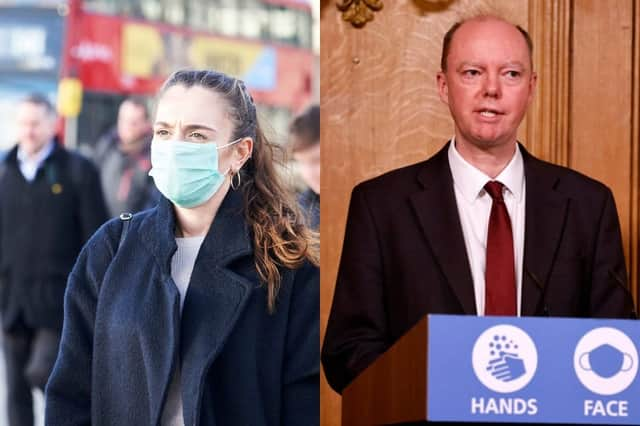Covid restrictions may still be needed next winter despite the vaccine rollout - what Chris Whitty said


Covid-19 restrictions may have to be brought back into place next winter to help control the virus, England’s Chief Medical Officer has warned.
Professor Chris Whitty said that UK residents need to be aware that the virus will not “disappear with spring”, adding that certain measures may still be needed, despite the vaccination rollout.
Risk level will fall over time
Advertisement
Hide AdAdvertisement
Hide AdSpeaking at a Downing Street press conference, Prof Whitty said that if people stick to the current rules “really strongly”, while the NHS is vaccinating “as fast as it can”, then the lockdown could be “enough” to control the virus.
It is hoped that the vaccination programme will get to a stage where no other lockdown measures are needed, although it will take some time before it is safe to ease restrictions.
As such, it could mean there is a possibility that a “few” measures would still be needed next winter, as it is during the colder months when viruses thrive.
Prof Whitty explained: “If we did not do all the things all of us must now do, if people don’t take the stay at home message seriously, the risk at this point in time, in the middle of winter with this new variant, is extraordinarily high.”
Advertisement
Hide AdAdvertisement
Hide AdThe risk level will gradually decrease over time, meaning measures could be “lifted by degrees possibly at different rates in different parts of the country”.
This will then reduce to a level of risk that society is “prepared to tolerate”, eventually falling to almost no restrictions at all. But, the Chief Medical Officer said, restrictions may become seasonal.
“We might have to bring a few [restrictions] in next winter, for example, that is possible, because winter will benefit the virus,” he explained.
“The aim of this is to de-risk it as much as possible by the vaccine to the point where we get to the stage where the risk is incredibly low, relative to where we are now, just as we do with flu, where every year an average of about 7,000 people die. In a bad year, up to 20,000 die. We accept there is a level of risk that society will tolerate.”
Vaccination will reduce risk
Advertisement
Hide AdAdvertisement
Hide AdProf Whitty added that the risk of spreading the virus will be reduced by vaccination, but zero risk “is not something which is a realistic possibility”, as the coronavirus, much like flu, “is not going to go away”.
However, it is hoped that a vaccination programme will mean restrictions may not be needed in the future at any stage, but this will take a long process.
He said: “The hope would be that we don’t need to do anything, certainly nothing on the scale we are having to at the moment, because vaccination should take the great majority, possibly all, of the heavy lifting.
“But I think we shouldn’t kid ourselves that this just disappears with spring.
Advertisement
Hide AdAdvertisement
Hide Ad“What will happen with spring is the risk will go right down, hopefully we’ll have spring, summer, autumn, possibly winter as well, with almost nothing in place once the full vaccination programme is through.”
“But then we had the problems with the new variant and the worst period of winter combining to lead to a significant increase since that time.
“We’re now into a situation where, across the country as a whole, roughly one in 50 people have got the virus. One in 50 is really quite a large number indeed.”
Following a review of the latest data earlier this week, Prof Whitty and the UK’s other medical advisers recommended that the country should move to coronavirus alert Level 5.